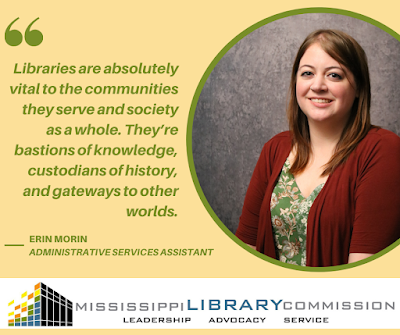Katie Gill
Cataloging Librarian
When you think of a library’s catalog, what’s the first thing you think of? If you’re older, you might think of pulling out a small drawer and rifling through all the cards to find the specific book you want. If you’re a millennial like myself, you might think of going to a computer terminal in your local public library, typing in a subject or title you’re interested in, and writing down the call number on a scrap of paper. But no matter what you think of when you think of a library’s catalog, you think of books. Searching for books in a database, looking at books printed on tiny little cataloging cards, going back to research because you wrote down the number wrong and can’t find what you’re looking for… Cataloging is an essential job, the art of creating an organized database so that patrons and staff can see what items a library has in its collection as well as where those items can be found in the library.
As libraries grow and expand to help serve all aspects of the community, the catalog also has to grow and expand to accommodate more than just books. It has audio, video, three-dimensional objects, games, seeds, bicycles, kits, and so on and so forth. The list goes on and on—ask three different libraries what non-book material they have in their catalog and they’ll give you three different answers. At MLC, our non-book collection mostly consists of kits, board games, and state documents. And as the cataloging librarian, it’s my job to make sure everybody can find them.
Our cataloging program, OCLC Connexion Client, connects to
WorldCat, a library management and collections system used throughout the United States. When I look up a book in Connexion Client, it will pull up multiple catalog entries used by various libraries that also use WorldCat. For example, searching for the title of a book can pull up the physical book, the ebook, the audiobook, and the large print version of the book. Usually, it’s easy enough to find the right catalog entry and copy it for use in our system (in a process called copy-cataloging). But sometimes, with non-book materials, the process can be deceptively hard.
Do you know how many times a classic board game can be reprinted? A lot. And that’s not counting the spin-off versions and reworkings said classic board game might have. When you’re cataloging the board game Labyrinth, it’s important that you’re cataloging the original game Labyrinth and not The Amazing Spider-Man Labyrinth, The Lord of the Rings Labyrinth, Master Labyrinth, Ocean Labyrinth, Secret Labyrinth, Harry Potter Labyrinth, Super Mario Labyrinth, or Despicable Me Labyrinth. It takes a lot of searching, a lot of double-checking, and a lot of complaining before finding the right game. That double-checking is necessary: some editions might have different rules than others. Likewise, the five-year-old obsessed with Minions would be pretty mad if the catalog said we had Despicable Me Labyrinth but we actually had Harry Potter Labyrinth.
But what about things that are created in-house? At MLC, we have some kits that public libraries can check out that we make ourselves. Some of them are easier to adapt than others. Our Story Walk kits and our Book Club kits are based off already-existing books. I can just copy the catalog entry for the BOOK and do some fiddling so that it’s about the KIT by changing the title, description, type of material, and contents, as well as a few other fields.
And then, there are times when I’ve just got to create the catalog entry myself. Whether it’s due to a kit that we make in-house or a state document that nobody else has for loan, there are times when it’s just me and that blank catalog entry. And that’s when I pore over all the cataloging books I keep in my office, looking at all the subjects and terms I can use, wondering how the heck I’m going to translate “a study of the variable depths of concrete in high-impact traffic studies” into a cute and catchy two-word phrase so that people can easily find this academic study.
So next time you’re at your local public library, search a little deeper in the catalog! Check out the videos, board games, seed packets, or other non-book items and spare a thought for the poor cataloging librarian who’s just now realizing she knows absolutely nothing about how roads work.

.png)
.png)

.png)
.png)
.png)
.png)
.png)
.png)
.png)


.png)
.png)




.png)

.png)







